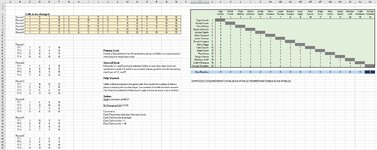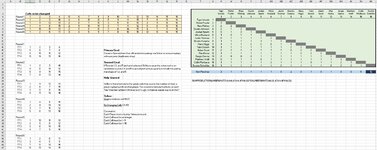Hello All, First Time Posting on here
I'm trying to create a golf pairing spreadsheet for a trip of 16 guys playing 6 rounds. Each Round will be 4 tee times of 4 guys. I've used the free pairing generator found on the internet but it's static and doesn't allow for our Ryder Cup Style format. 3 of our 6 rounds will be selected by Team Captains. My goal is to create a spreadsheet that will randomize the pairings so that everyone can play with as many people as possible. I want the ability to re-run this spreadsheet after each round given the captain pairings so that it updates future pairings based on historical pairings. I'm currently trying to use Solver to come up with multiple solutions but it doesn't return anything different. Any Ideas would be greatly appreciated. I've uploaded an image of my spreadsheet as it currently sits (1st image). Currently everyone is playing with everyone. However if you adjust Round 1 to be 1,2,3,......,16 across the board, there are 12 occurrences where players don't get paired (as seen in the 2nd image).
IT department doesn't allow me to download the add-in so I can upload my spreadsheet so I apologize in advance for that.
I'm trying to create a golf pairing spreadsheet for a trip of 16 guys playing 6 rounds. Each Round will be 4 tee times of 4 guys. I've used the free pairing generator found on the internet but it's static and doesn't allow for our Ryder Cup Style format. 3 of our 6 rounds will be selected by Team Captains. My goal is to create a spreadsheet that will randomize the pairings so that everyone can play with as many people as possible. I want the ability to re-run this spreadsheet after each round given the captain pairings so that it updates future pairings based on historical pairings. I'm currently trying to use Solver to come up with multiple solutions but it doesn't return anything different. Any Ideas would be greatly appreciated. I've uploaded an image of my spreadsheet as it currently sits (1st image). Currently everyone is playing with everyone. However if you adjust Round 1 to be 1,2,3,......,16 across the board, there are 12 occurrences where players don't get paired (as seen in the 2nd image).
IT department doesn't allow me to download the add-in so I can upload my spreadsheet so I apologize in advance for that.







